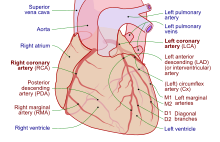| Coronary ischemia | |
|---|---|
| Other names | myocardial ischemia, cardiac ischemia |
 | |
| Coronary arteries of the human heart | |
| Specialty | Cardiology |
Coronary ischemia, myocardial ischemia,[1] or cardiac ischemia,[2] is a medical term for abnormally reduced blood flow in the coronary circulation through the coronary arteries.[3] Coronary ischemia is linked to heart disease, and heart attacks.[4] Coronary arteries deliver oxygen-rich blood to the heart muscle.[5] Reduced blood flow to the heart associated with coronary ischemia can result in inadequate oxygen supply to the heart muscle.[6] When oxygen supply to the heart is unable to keep up with oxygen demand from the muscle, the result is the characteristic symptoms of coronary ischemia, the most common of which is chest pain.[6] Chest pain due to coronary ischemia commonly radiates to the arm or neck.[7] Certain individuals such as women, diabetics, and the elderly may present with more varied symptoms.[8] If blood flow through the coronary arteries is stopped completely, cardiac muscle cells may die, known as a myocardial infarction, or heart attack.[9]
Coronary artery disease (CAD) is the most common cause of coronary ischemia.[7] Coronary ischemia and coronary artery disease are contributors to the development of heart failure over time.[10] Diagnosis of coronary ischemia is achieved by an attaining a medical history and physical examination in addition to other tests such as electrocardiography (ECG), stress testing, and coronary angiography.[11] Treatment is aimed toward preventing future adverse events and relieving symptoms.[12] Beneficial lifestyle modifications include smoking cessation, a heart healthy diet, and regular exercise.[13] Medications such as nitrates and beta-blockers may be useful for reducing the symptoms of coronary ischemia.[6] In refractory cases, invasive procedures such as percutaneous coronary intervention (PCI) or coronary artery bypass graft (CABG) may be performed to relieve coronary ischemia.[14]
Recently, evidence has been found that ischemia can also occur without coronary obstruction (a conditional known as INOCA - ischemia with no obstructed arteries).[1] Other studies have found that Long COVID or post acute COVID syndrome can also be associated with myocardial ischemia.[15] Treatment for both conditions is similar to treatment for ischemia caused by CAD.[1][15]
- ^ a b c "Myocardial ischemia". Mayo Clinic. Retrieved 2019-11-29.
- ^ Potochny, Evy. "Cardiac Ischemia Symptoms." LiveStrong. Demand Media, 9 March 2010. Web. 6 Nov. 2010.
- ^ "Sacred Heart Medical Center. Spokane, Washington. Coronary Ischemia". Shmc.org. Archived from the original on 2009-05-01. Retrieved 2008-12-28.
- ^ Cite error: The named reference
:3was invoked but never defined (see the help page). - ^ "Anatomy and Function of the Coronary Arteries". www.hopkinsmedicine.org. 23 November 2020. Retrieved 2020-11-24.
- ^ a b c Cite error: The named reference
:13was invoked but never defined (see the help page). - ^ a b Cite error: The named reference
:4was invoked but never defined (see the help page). - ^ Cite error: The named reference
:6was invoked but never defined (see the help page). - ^ Cite error: The named reference
:7was invoked but never defined (see the help page). - ^ Lala A, Desai AS (April 2014). "The role of coronary artery disease in heart failure". Heart Failure Clinics. 10 (2): 353–365. doi:10.1016/j.hfc.2013.10.002. PMID 24656111.
- ^ Cite error: The named reference
:1was invoked but never defined (see the help page). - ^ Cite error: The named reference
:16was invoked but never defined (see the help page). - ^ Cite error: The named reference
:9was invoked but never defined (see the help page). - ^ Cite error: The named reference
:17was invoked but never defined (see the help page). - ^ a b Mohammad, Khan O.; Lin, Andrew; Rodriguez, Jose B. Cruz (December 2022). "Cardiac Manifestations of Post-Acute COVID-19 Infection". Current Cardiology Reports. 24 (12): 1775–1783. doi:10.1007/s11886-022-01793-3. ISSN 1523-3782. PMC 9628458. PMID 36322364.